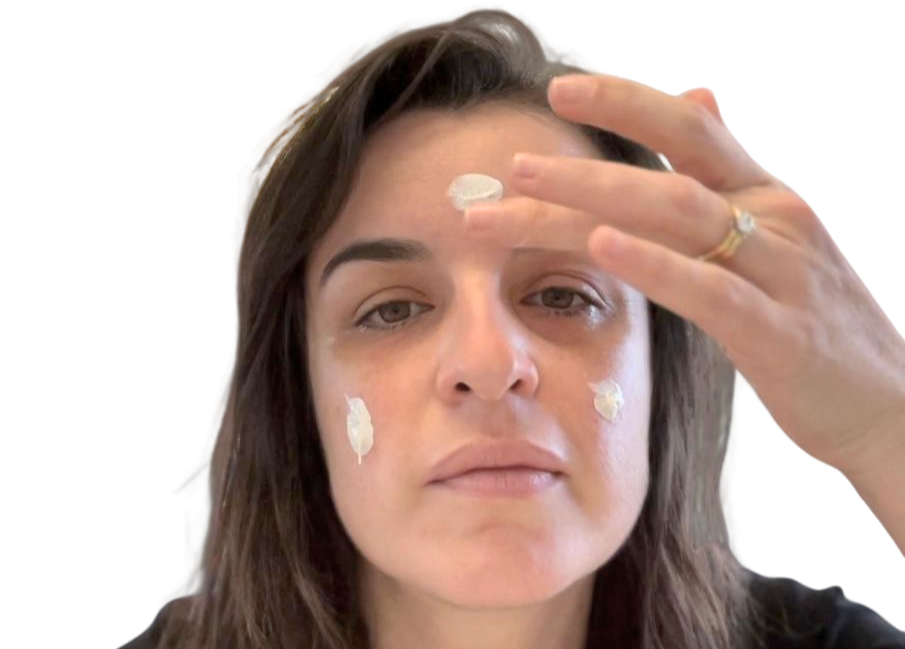Let’s be honest: modern skincare is practically a full-time job. There’s a lot out there—it’s overwhelming—and you’re doing your best to keep up. You’ve just added a new serum with its 10-step application guide! But here’s the hard truth: if you’re not applying sunscreen every single morning, you’re leaving your skin vulnerable to sun damage and accelerating skin aging. All that effort (and money) could be going to waste without this one essential step.
I know. You are aware sunscreen is incredibly important and prevents sunburns and skin cancer. Of course. That alone is reason enough to use it daily. But what many people don’t realize is that sunscreen is also the single most effective anti-aging skin product available.
The Sun Is Aging You Faster Than Stress and Sleeplessness Combined
I’m not being dramatic. Up to 80% of facial aging is caused by exposure to ultraviolet (UV) radiation from the sun—even when it’s cloudy or cold outside.
Here’s what happens: Within just 3–5 minutes of sun exposure, UV rays start degrading collagen and elastin—the proteins that keep your skin firm and youthful. You won’t feel it, and you definitely won’t see it right away, but the effects accumulate. Sun exposure leads to wrinkles, sagging, uneven texture, sunspots and hyperpigmentation.
This process is called photodamage, and it’s by far the greatest contributor to an aging face and complexion, what most of us think of as “aging.” That’s where sunscreen comes in! Acting as a protective barrier, sunscreen shields skin from both the short-term and long-term effects of UV exposure – so combats photoaging and the wrinkles that come with it.
Bonus: Sunscreen Doesn't Just Prevent Damage - It Can Reverse It
If this all sounds a bit doom-and-gloom, here’s the good news: it’s never too late to start. Daily SPF use doesn’t just stop future damage—it can actually improve your skin.
In a 1-year study, participants who used SPF 30 daily showed visible improvements in clarity and texture as early as 12-weeks. By the end, 100% of them saw benefits Randhawa et al., 2016. Not a typo—every single one.
In other words: your sunscreen is working even when you don’t see it working.
So...Which Sunscreen Should You Be Using?
Let’s simplify it:
✅ Go Broad Spectrum
Sunlight contains two forms of ultraviolet (UV) radiation, U-VA and UV-B, which cause skin damage leading to premature skin aging, damage to collagen and elastin, wrinkle formation, and skin cancer.
Broad spectrum means it protects against both:
- UVA rays = aging + deeper damage
- UVB rays = burning
If the bottle doesn’t say broad spectrum, it’s not enough.
✅ Understand the SPF Number
SPF stands for Sun Protection Factor, and it measures UVB protection. It tells you how long sunscreen protects your skin from sunburn
- SPF 30 blocks about 97% of UVB rays
- SPF 50 blocks about 98% of UVB rays
The real secret? Reapplying every two hours. Even the fanciest formula won’t last all day—especially if you’re sweating, swimming or outdoors.
✅ Check the UVA Rating (UK Readers)
- Look for the UVA logo in a circle (EU standard)
- Or the Boots star rating (aim for 4 or 5 stars)
✅ Chemical Vs Mineral: What's the Difference?
- Chemical (like avobenzone or octinoxate):
- Chemical refers to it being a chemical compound – can also be called organic as in, organic compound
- Absorbs UV rays before they cause damage.
- Blends beautifully under makeup, can be better for darker skin tones (blends in without white cast) and good for active lifestyles (often more water- and sweat-resistant)
- Mineral (zinc oxide, titanium dioxide):
- Sits on top of skin and reflects rays.
- Look for “non-nano” zinc if you’re cautious about particles
- Great for sensitive skin, rosacea, or acne-prone types.
Both work! Choose what suits your skin—and what you’ll actually use.
Still Believing These Myths? Let's Clear Them Up
"I don't need sunscreen - I have darker skin."
Yes, melanin offers some protection. But not nearly enough to prevent collagen loss, pigmentation, or skin cancer. The same is true if you have a tan, a tan does not protect your skin from the sun’s harmful effects.
"I only need SPF in Summer."
No! UVA rays are year-round, and they penetrate clouds and windows.
"Expensive means better."
Ignore the price – read the label! Some of the best sunscreens are at your local pharmacy. Read the back of the bottle, not the brand name on the front. It’s what’s on the back that counts.
And Please: Apply It Properly (Most People Don't)
Here’s your cheat sheet:
- 1 teaspoon for face and neck
- 1 shot glass (about 30ml or 8 teaspoons) for the rest of your exposed skin
- Apply 15–30 minutes before sun exposure
- Wait 10–20 minutes before dressing (your clothes shouldn’t wear your SPF)
- Reapply every 2 hours, or more often if you’re sweating, swimming, or living your best outdoorsy life
Bottom Line: Sunscreen Is the Best Skincare Investment You Can Make
It’s relatively cost-effective, accessible and should be a routine the whole family follows. Sunscreen doesn’t need to be fancy. It needs to meet the scientific and regulatory gold standards set out above. Crucially it needs to be used—daily, year-round, without fail.
Think of it as a pension plan for your skin. Your 30,40,50 and 60-year-old self will thank you.
💬 Ready to Simplify Your Skincare
If you’re unsure and are looking for guidance for what suits your skin, lifestyle and support with medically based age management, book a consultation and I’ll cut through the jargon and help you find what works—for you.
👉 Book your consultation in Belsize Park, London
The fine print: This content is for informational purposes only and does not replace medical advice. Consultations are required to assess suitability before treatment. Individual results vary. No treatments are offered without a clinical assessment

